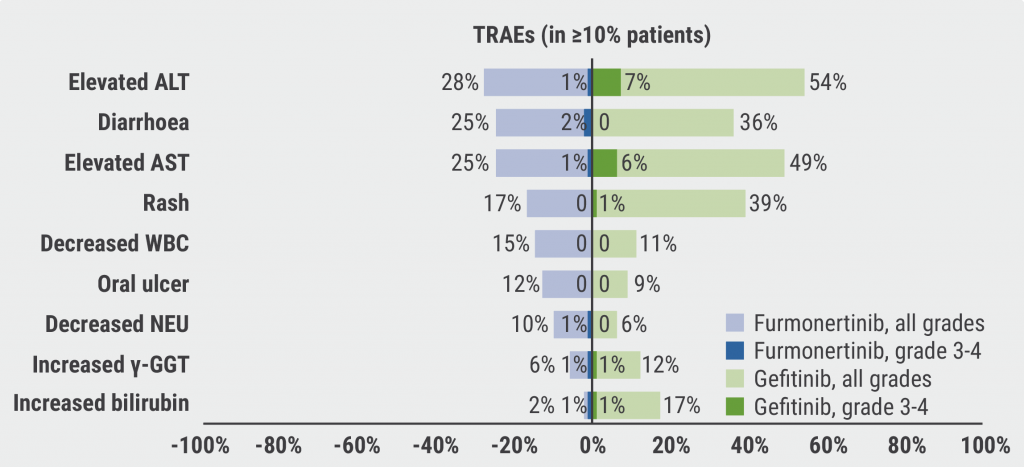
The 2023 ESMO Annual Meeting is to be remembered: This year has brought us a rarely precedented load of practice-changing studies including:
A feast for oncologists treating lung cancer with new data on the benefits of peri-operative immune chemotherapy in operable stages, as well as strategies in the adjuvant targeted treatments of oncogene-driven non-small cell lung cancer. News also accumulates in advanced lung cancer disease, from the treatment of niche indications (as EGFR exon 20 mutations) as well as antibody-drug-conjugates (ADC).
A dazzling number of ADCs are invading the scene, making it a challenge to remember substance names and correctly attribute them to their indications.
An ADC also represents a new standard in advanced urothelial bladder cancer – with a benefit translated by a hazard ratio rarely witnessed in urothelial cancers – leading to a long enthusiastic standing ovation to the presenter (Prof. T. Powles) by the thousands of attendees during a Presidential Session.
Also surprising, there is progress in areas which have been in hope for good news for a long time – such as systemic induction in locally advanced cervical cancer.
Both research (check out our digest) and educational sessions (which you can check out via OncologyPro on esmo.org) covered a plethora of topics and truly relevant themes. I would like to attract your particular attention to the session on the rechallenge of checkpoint inhibitors and oligometastatic disease.
Likely, not all relevant news will be presented in our report, we apologize, but we were tasked to make difficult choices to stick to our report’s content size limits.
Last but not least, in the midst of a horrible year in political and climate change, this congress really brought some good news
Please, enjoy the read!
Yours, sincerely
Stefan Rauh
Biography
Dr Stefan Rauh is currently working as haematooncologist in the oncology department of Centre Hospitalier Emile Mayrisch, Esch, Luxembourg. He is mainly involved in clinical work but also in research and teaching activities and is interested in public policy and international cooperation projects in oncology. He is member of the ESMO Practicing Oncologist’s Working Group since 2011 (chair 2014-2018), member of the ESMO Public Policy Committee, and has been an ESMO Executive Board member in 2015-2016. He is coauthor of the 2017 ESMO European Cancer Patient Coalition (ECPC) Patient Survivorship Guide and an invited expert for the ECPC.
Conflict of Interest Statement: Nothing to declare.
Posted on
Previous Article
« Addition of atezolizumab to chemotherapy and maintenance PARP inhibitor has no benefit in ovarian cancer Next Article
ASH 2023 Highlights Podcast »
« Addition of atezolizumab to chemotherapy and maintenance PARP inhibitor has no benefit in ovarian cancer Next Article
ASH 2023 Highlights Podcast »
Table of Contents: ESMO 2023
Featured articles
The importance of detecting early NSCLC
Breast Cancer
Benefit of pembrolizumab in TNBC remains after 5 years of follow-up
Addition of pembrolizumab promising in early-stage high-risk ER+/HER2- breast cancer
Long-term air pollution exposure at both residential and workplace locations increases breast cancer risk
Third-line datopotamab deruxtecan improves progression-free survival in previously treated metastatic HR+/HER2- breast cancer compared with chemotherapy
Colorectal Cancer
Neoadjuvant nivolumab/relatlimab demonstrates 100% pathological response in MMRd colon cancer
Selective KRASG12C inhibitor sotorasib leads to superior PFS in colorectal cancer
Postoperative ctDNA predicts survival in colorectal cancer
Overall survival in patients with initially unresectable colorectal liver metastases does not depend on choice of induction regimen
Lung Cancer
Perioperative nivolumab boosts event-free survival in NSCLC
Selective RET inhibitor selpercatinib doubles progression-free survival in RET-mutated NSCLC
Dato-DXd outperforms docetaxel in previously treated patients with metastatic NSCLC
First-line and second-line benefit of amivantamab in advanced, EGFR-mutated NSCLC
Upper Gastro-Intestinal Cancer
Perioperative durvalumab/FLOT improves pCR in gastric cancer
Active surveillance after neoadjuvant chemoradiotherapy in oesophageal cancer
FOLFIRINOX equals gemcitabine-based chemoradiotherapy in neoadjuvant setting for pancreatic cancer
Modified FLOT regime outperforms FOLFOX in advanced/metastatic gastric/gastroesophageal junction adenocarcinoma
Melanoma
Lifileucel induces a durable response in heavily pretreated mucosal melanoma
Darovasertib/crizotinib combination: a potential first-line therapy in metastatic uveal melanoma
Genito-Urinary Cancers
Two potential new first-line standards of care in metastatic urothelial cancer
LuPSMA and enzalutamide: a promising combination
No benefit of erdafitinib over pembrolizumab in urothelial cancer second-line therapy
Gynaecological Cancers
Addition of atezolizumab to chemotherapy and maintenance PARP inhibitor has no benefit in ovarian cancer
Short-induction chemotherapy improves survival in advanced cervical cancer
Neoadjuvant immune checkpoint blockade safe and effective in MMRd endometrial cancer
Featured Interviews
Can radiotracers predict response to PD-L1 inhibitors in early NSCLC?
The importance of detecting early NSCLC
Related Articles

June 25, 2019
Immunotherapy in SCLC: trial data
© 2024 Medicom Medical Publishers. All rights reserved. Terms and Conditions | Privacy Policy
HEAD OFFICE
Laarderhoogtweg 25
1101 EB Amsterdam
The Netherlands
T: +31 85 4012 560
E: publishers@medicom-publishers.com

